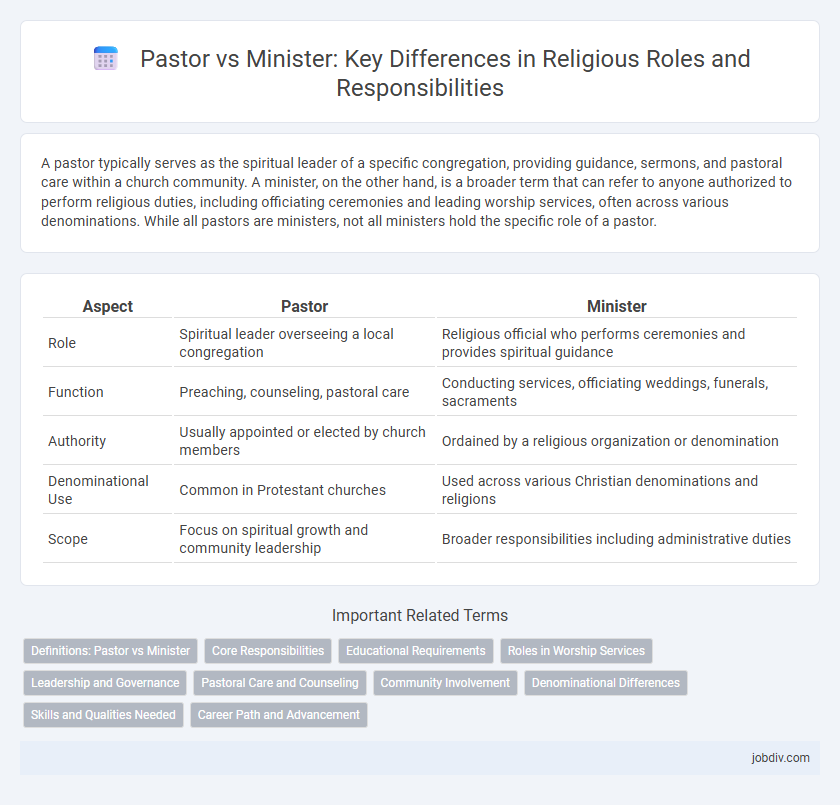A pastor typically serves as the spiritual leader of a specific congregation, providing guidance, sermons, and pastoral care within a church community. A minister, on the other hand, is a broader term that can refer to anyone authorized to perform religious duties, including officiating ceremonies and leading worship services, often across various denominations. While all pastors are ministers, not all ministers hold the specific role of a pastor.
Table of Comparison
| Aspect | Pastor | Minister |
|---|---|---|
| Role | Spiritual leader overseeing a local congregation | Religious official who performs ceremonies and provides spiritual guidance |
| Function | Preaching, counseling, pastoral care | Conducting services, officiating weddings, funerals, sacraments |
| Authority | Usually appointed or elected by church members | Ordained by a religious organization or denomination |
| Denominational Use | Common in Protestant churches | Used across various Christian denominations and religions |
| Scope | Focus on spiritual growth and community leadership | Broader responsibilities including administrative duties |
Definitions: Pastor vs Minister
A pastor is a religious leader primarily responsible for the spiritual care and guidance of a specific congregation, often emphasizing preaching, teaching, and pastoral counseling. A minister is a broader term that includes individuals authorized to perform religious rites and ceremonies, which can encompass pastors, priests, or other clergy members across various denominations. The distinction lies in the pastor's focused role within a local church community, while ministers may serve diverse functions within religious organizations.
Core Responsibilities
Pastors primarily focus on shepherding their congregation through spiritual guidance, preaching, counseling, and pastoral care. Ministers often have broader roles that may include leading worship services, administering sacraments, and managing church programs or outreach efforts. Both roles emphasize serving the spiritual and practical needs of their faith community but differ in scope and specific responsibilities.
Educational Requirements
Pastors typically undergo formal theological education, often earning a Bachelor of Theology or Divinity degree from accredited seminaries, while ministers may have varied educational backgrounds depending on the denomination or faith tradition. Many denominations require pastors to complete specific ministerial training programs, including pastoral counseling, homiletics, and biblical studies, ensuring comprehensive preparation for spiritual leadership. In contrast, some ministers might be appointed based on experiential learning or church-specific criteria without extensive formal education.
Roles in Worship Services
Pastors typically lead worship services by delivering sermons, providing spiritual guidance, and conducting sacraments such as baptisms and communion. Ministers often support worship by assisting with prayers, organizing service elements, and facilitating community outreach programs. Both roles emphasize fostering congregational participation and spiritual growth within the church setting.
Leadership and Governance
Pastor typically denotes a spiritual leader responsible for preaching, pastoral care, and guiding a congregation, with a focus on shepherding and nurturing church members. Minister often refers to a broader role that includes administrative leadership, governance, and overseeing church operations or denominational functions. Leadership in a church context involves both spiritual guidance and organizational management, where pastors emphasize relational leadership and ministers emphasize structural governance.
Pastoral Care and Counseling
Pastors typically provide comprehensive pastoral care, offering spiritual guidance, emotional support, and counseling to individuals and families within their congregation. Ministers may focus more on preaching and administrative duties but often engage in counseling related to faith and moral issues. Pastoral care emphasizes a holistic approach to nurturing spiritual well-being through compassionate listening, prayer, and personalized support.
Community Involvement
Pastors often engage deeply in community involvement by providing spiritual guidance, counseling, and organizing local outreach programs to meet the needs of their congregation and neighborhood. Ministers also participate actively in community service, frequently leading social justice initiatives and supporting charitable activities to promote inclusivity and social welfare. Both roles emphasize fostering strong community connections, though pastors may focus more on pastoral care while ministers might address broader social concerns.
Denominational Differences
Pastor and minister roles vary significantly across denominations, with pastors often serving as spiritual leaders within Protestant churches and ministers commonly aligned with liturgical traditions such as Anglican or Methodist churches. Denominational differences influence the scope of duties, ordination processes, and congregational expectations, where pastors may focus on shepherding and preaching, while ministers might emphasize sacraments and formal worship. Understanding these distinctions is essential for recognizing the diverse functions clergy fulfill in distinct Christian denominations.
Skills and Qualities Needed
Pastors require strong leadership skills, deep biblical knowledge, and the ability to provide spiritual guidance and counseling to a congregation. Ministers must possess excellent communication abilities, empathy, and the capacity to perform religious ceremonies and community outreach effectively. Both roles demand a commitment to pastoral care, ethical integrity, and the ability to inspire faith within their communities.
Career Path and Advancement
A pastor typically leads a specific congregation, providing spiritual guidance, counseling, and community leadership, often advancing through roles like associate pastor or senior pastor. Ministers may serve in broader capacities, including administrative, missionary, or denominational leadership positions, allowing for diverse career paths in religious organizations. Career advancement for both roles depends on theological education, experience, denominational requirements, and demonstrated leadership skills within their faith communities.
Pastor vs Minister Infographic

 jobdiv.com
jobdiv.com